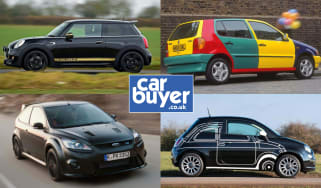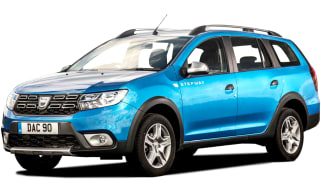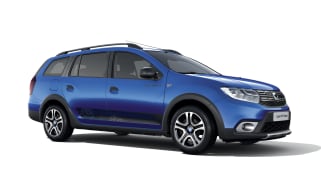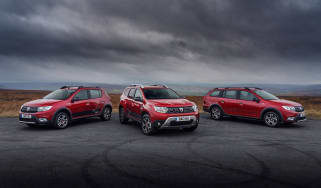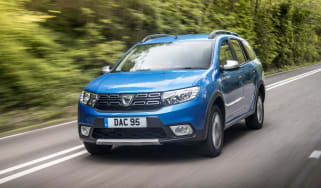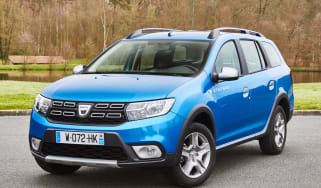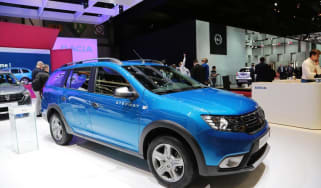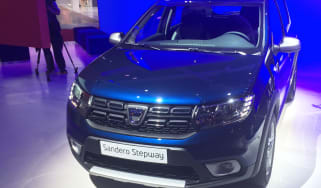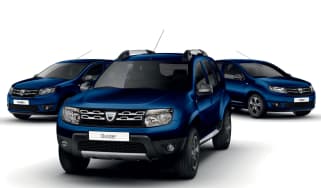Dacia Logan MCV estate (2013-2021)
"The Dacia Logan MCV is an estate car with a huge boot, but it costs less than many superminis"
Pros
- Large, practical boot
- Cheap to run
- Great value
Cons
- Slow petrol engines
- Poor standard equipment
- Entry-level model is very basic
If you simply need a practical, no-frills estate car, the Dacia Logan MCV offers lots of space for less money than the average city car. Standing for ‘Maximum Capacity Vehicle’, the Logan MCV wears its heart on its sleeve, paying far more attention to load-lugging practicality than the latest gadgets or soft-touch interior surfaces. The upshot is a car the size of a Ford Focus Estate or Skoda Octavia Estate, with a lower starting price than a Toyota Aygo. While neither can match the MCV for boot space or price, the Skoda Fabia Estate is the Dacia’s closest rival.
The Logan MCV is more about substance than style, inside or out, with simple looks and pared-back features, but it certainly isn’t offensive to the eye. And with many of its parts being adopted from parent company Renault – where they’ve already proved their worth – it should be reliable, too.
The Logan MCV range has recently been through a round of updates, which have helped to boost its visual appeal, including a new front bumper with chrome highlights to the air intake, while new headlamps incorporate Dacia’s unique LED daytime running light signature. The updates also ushered in a new model, the Logan MCV Stepway.
More reviews
In-depth reviews
The Stepway has a strong hint of the SUV about it, with a raised ride height, butch matt-black wheelarch extensions and tough-looking bumpers with satin-silver skid panels. Combined with dark 16-inch wheels, the Stepway has a similar rugged, urban appeal to the Citroen C4 Cactus, but with a lot more accommodation on offer.
Best cars for transporting bikes
Four engines are available and the 1.5-litre Blue dCi 95 diesel is our pick of the bunch. It manages up to 62.7mpg and only emits 115-116g/km of CO2, but is more costly to buy than the three petrol choices.
The most basic of the petrols is a 74bhp SCe 1.0-litre that you can only choose in entry-level Access trim, the bare-bones model that enables the Logan MCV’s headline-grabbing starting price. The 89bhp TCe 90 0.9-litre costs a little more, but is far more enjoyable. For 2020, a new 1.0-litre TCe 100 Bi-Fuel engine was added to the line-up, with the promise of low running costs thanks to its ability to switch between petrol and LPG.
The Access model boasts an extremely appealing price tag, but its interior is truly barren, lacking many of the amenities you may find essential, including air-conditioning and a radio – and there’s no central locking, either. The Essential model is far more civilised, with those three included, as well as Bluetooth. The Comfort is rather well equipped and includes a seven-inch touchscreen infotainment system with sat nav, and adds cruise control despite still undercutting most similarly sized rivals.
The adventurous-looking Stepway builds on the Comfort trim and has a raised ground clearance and roof rails for added flexibility.
There are a few blemishes on the Logan MCV's report card. Its Euro NCAP crash-test result was disappointing – it received only three stars due to a mediocre 57% score for adult occupant protection in a front impact and it lacks some of the safety technology found in rivals. Dacia also finished at the bottom of the pile in our 2020 Driver Power owner satisfaction survey. The Logan wasn't represented individually in these results, though, and still stands out as offering exceptional value for money.




